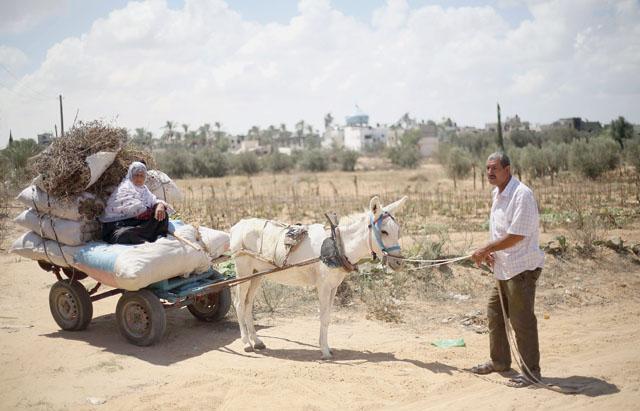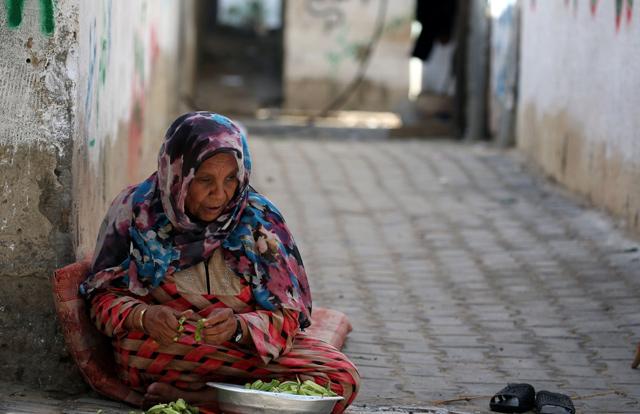You are here
UNCTAD points to deteriorating economy in crisis-hit Palestinian territories
By Agencies - Sep 04,2014 - Last updated at Sep 04,2014

GENEVA — The already faltering Palestinian economy further shrank in 2013 and 2014, even without taking into account devastation caused by the recent conflict with Israel, a UN development agency said Wednesday.
Economic growth slumped from 11 per cent in 2010 and 2011 to just 1.5 per cent last year, and was set to shrink further, the UN Conference on Trade and Development (UNCTAD) indicated.
"The deterioration of the Palestinian economy, largely rooted in the territory's occupied status, has resulted in weak growth, a precarious fiscal position, forced dependence on the Israeli economy, mass unemployment, wider and deeper poverty and greater food insecurity," UNCTAD said.
The agency, which produces regular studies of the Palestinian economy, underlined that its latest edition did not take into account the impact of the latest Gaza conflict.
But UNCTAD's coordinator for the Palestinian territories, Mahmoud Elkhafif, told reporters that $4 billion was a "very conservative estimate" for the cost of rebuilding Gaza.
According to the UN, Israeli military operations in Gaza destroyed or damaged 40,000 homes, 141 schools, 29 hospitals, dozens of factories and vast swathes of farmland in the densely population territory.
Unemployment is sky-high, at 36 per cent in Gaza and 22 per cent in the West Bank, and one family in four struggles to feed itself, Elkhafif pointed out
UNCTAD said Gaza's economy was in a "state of total collapse" even before the summer's fighting.
It blamed the seven-year blockade on the territory and previous Israeli operations in November 2012 and December 2008.
"Exports from Gaza are almost completely banned, imports are severely restricted and the flow of all but the most basic humanitarian goods has been suspended for years," it said.
"Gaza's local economy has been further suppressed by restrictions on the transfer of cash, including dollars and Jordanian dinars, which have stunted its banking sector," it added.
UNCTAD warned of "grave consequences" if the Palestinian economy was not brought back on its feet fast.
Foreign aid alone is not enough, it remarked, calling for "renewed development efforts through investing in productive sectors and crucial infrastructure so that the productive base is rebuilt".
But a lasting recovery of the Palestinian economy in general will be impossible without a sustained international effort to end restrictions on movement in and access to the West Bank, UNCTAD stressed.
It also called for the "complete lifting of the Gaza blockade, which has been smothering Gaza's local economy and isolating 1.8 million people from the outside world”.
UNCTAD warned of the ongoing "de-development" of the Palestinian economy, reinforced by recurring military campaigns.
It also criticised Israel's total control of the resource-rich "Area C", which covers almost two-thirds per cent of the West Bank.
Israel has an effective ban on Palestinian construction in 70 per cent of Area C and imposes limits in 29 per cent, leaving just one per cent for Palestinian development, UNCTAD indicated.
"Israeli policies in Area C and the ongoing construction and expansion of illegal settlements have altered the West Bank's landscape into an archipelago of disconnected islands," it said.
The number of colonists in the West Bank topped 360,000 in 2012, compared with 800 in 1972, the report underlined.
Separately, the Palestinian Authority (PA) said on Thursday that rebuilding Gaza will cost $7.8 billion, in the most comprehensive assessment yet of damage from a seven-week war with Israel during which whole neighbourhoods and vital infrastructure were flattened.
The cost of rebuilding 17,000 Gazan homes razed by Israeli bombings would be $2.5 billion, the PA indicated, and the energy sector needed $250 million after the Strip's only power plant was destroyed by two Israeli missiles.
"The attack on Gaza this time had no precedent, Gaza has been hit with a catastrophe and it needs immediate help because many things can't wait long," Mohammed Shtayyeh, a Palestinian economist and a senior member of the West Bank's dominant Fatah party, told reporters in Ramallah.
Rebuilding Gaza would depend heavily on foreign aid and would require an end to Palestinian rivalry and Israel opening its border crossings, stressed Shtayyeh, who heads the Palestinian Economic Council for Research and Development (PECDAR) which ran the survey.
But none of the factors mentioned by Shtayyeh appeared forthcoming. A donor conference in Cairo has yet to be formally scheduled, Palestinian institutions remain divided between Gaza and the West Bank and Israel has yet to fundamentally ease the movement of people and goods at its Gaza border.
The PA's assessment also found that the strip's education sector would need around $143 million to get back on its feet. About half a million children have been unable to return to their schools due to damage or because the buildings are being used to house refugees.
Over 106,000 of Gaza's 1.8 million residents have been displaced to UN shelters and host families, the UN says.
The remaining billions of dollars in the PECDAR assessment, which was compiled by 13 experts resident in Gaza and their research teams, were allocated to the financial, health, agriculture, and transportation sectors, all of which suffered widespread damage during the war.
The assessment also earmarked $670 million for an airport and sea port, which Shtayyeh said was a Palestinian right, but Israel has so far rejected.
A ground incursion and bombing from the land, air and sea caused huge destruction in Gaza, while Palestinian rocket fire drove many Israelis from border communities, hit Israel's summer tourism revenues and briefly shut down its main airport.
An international donor conference jointly chaired by Egypt and Norway has yet to be formally scheduled, and Israel has not fundamentally changed its curbs on the movement of people and goods, especially crucial building materials, on Gaza's border.
The cash-strapped PA barely has enough money to pay its own employees in the West Bank and has no immediate plans to pay employees in the Hamas-run Gaza Strip, despite a unity pact signed between Fateh and Hamas in April.
"The Authority needs to be able to work as an authority to become completely responsible for all aspects of life in Gaza," Shtayyeh told reporters.
Related Articles
GENEVA — The Palestinian economy could easily double, while sky-high unemployment and poverty would plummet if the Israeli occupation were l
GENEVA — Israel's war against Hamas has decimated Gaza's economy, shrinking it to less than one-sixth of its 2022 level, amid an "alarming d
GENEVA — The UN said Wednesday that the situation in Gaza was "catastrophic" after 11 years of "economic siege" and warned that Washington's













